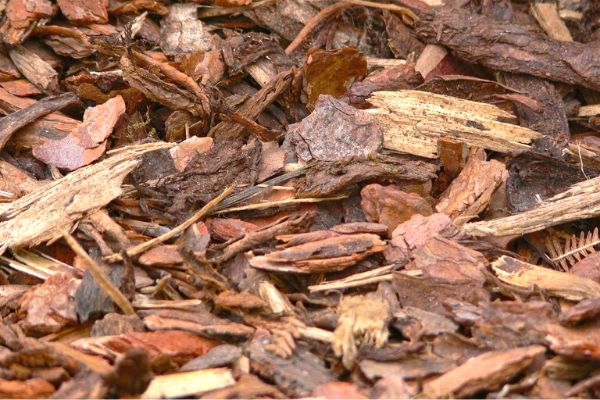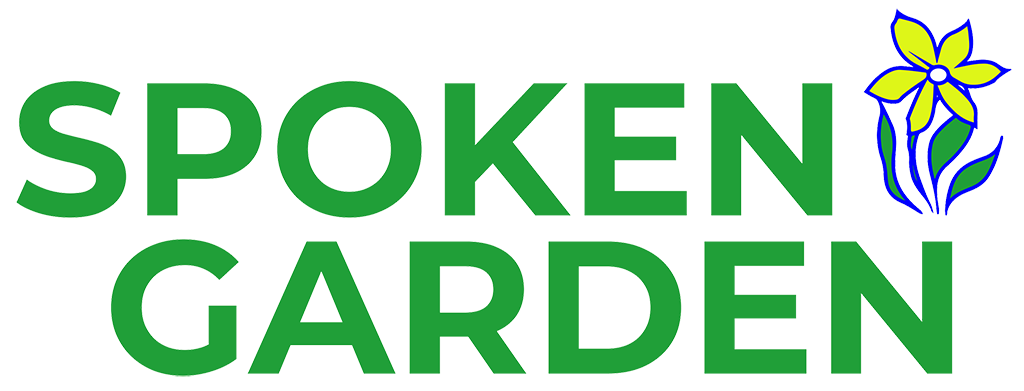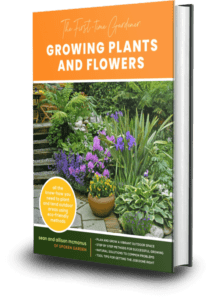What You’ll Learn:
- What you should and shouldn’t do when mulching this fall.
- Recommendations for mulching tools to purchase.
- Books to read and help you dig deeper into mulching.
- Links for further resources or education throughout the post.

Any time of year is a great time to mulch, especially during the fall season.
In the fall, plants are starting their dormancy process for the winter and will need that extra layer of insulation for the upcoming cold winter temperatures. New nutrients from a natural mulch can provide this protection.
However, many gardeners don’t understand the correct way to spread their mulch which can lead to further problems down the road.
If you are not sure where to get started on mulching, go to our Mulching Start Here page to get the basics.
In this quick DIY Garden Minute podcast, learn the do’s and don’ts for fall mulching and the correct information to help you prepare your garden for this coming winter. Keep your plants’ roots insulated, protected, and healthy.
This episode is perfect for a beginning gardener or new homeowner who wants to learn useful do’s and don’ts for fall mulching. For specific mulching steps, check out how to mulch and learn about different mulches to use, like pine needle mulch.
Fall Mulching Do’s and Don’ts
Do #1: Use Chunky Mulch
Use coarser mulches that are chunkier or larger-sized so it doesn’t break down as fast in your garden over the colder seasons. This will provide many different benefits to your garden and yard.
Do #2: 2-4 inches Rule
Spread mulch to a minimum of 2-inches and a maximum of 4-inches. If you are squelching or suffocating any plant materials and don’t have any other plants in the area, then thicker mulch depths are good up to 8 to 12-inches of mulch.
Do #3: Include Green Material
Include green or leafy material in your mulch. By doing this, nutrients can be available faster to be used by plants as they can break down and move through the soil faster.
Do #4: Use Natural Barriers
Try to use natural added barriers below mulch for a weed barrier such as leaves, newspaper, cardboard, and burlap.
Fall Mulching Don’ts
Don’t #1: No Direct Contact
Mulch should never be placed directly up against trunks, stems, or other plant tissues. If it is placed this close, it might keep too much moisture too close to plant tissues thus increasing disease and/or pest damage.
Don’t #2: No Weeds
Don’t ever spread mulch that has any weeds or invasive vines in it. This could result in spreading these bad plants throughout your garden creating many new problems. Find reputable, clean mulch sources.
For more information, listen to the podcast!
Mulching Tools to Use
We have spent multiple seasons mulching all our garden areas and these tools are highly recommended for successful mulch spreading. Don’t risk injury by not using a wheelbarrow, pitchfork, or other necessary items.
Conclusion for Fall Mulching Do’s and Don’ts
There are so many benefits to mulching your garden this fall, and this is a great time to get it done. While insulating your plant’s roots, mulch will help to build your garden soil. By following these fall mulching do’s and don’ts, you can be sure you’ve mulched your garden correctly and your plants are going to be healthier for it.
Best of luck to you and always remember to have fun!
Thanks for Listening!
That’s all for this podcast episode! You can find other beginning gardener topics on
our podcast page by clicking here or go to SpokenGarden.com and click on the “Listen” tab. Also find us on your favorite podcast platform and smart speaker!
Share our show or follow us on
Subscribe on
*Spoken Garden is a participant in the Amazon Services LLC Associates Program, an affiliate advertising program designed to provide a means for sites to earn advertising fees by advertising and linking to Amazon.com.
-
Some of the resources and products below may be affiliate links, meaning we might get paid a commission (at no extra cost to you) if you use that link to make a purchase. Anvil vs Bypass Pruning Shears – DIY Garden Minute Ep. 9 (podcast)
Checkout and Pre-Order our New Book: 1st Time Gardener: Growing Plants and Flowers.
To Be Released February 9th, 2021!Want to get started, but not sure on what? Go to our Start-Here Page!









